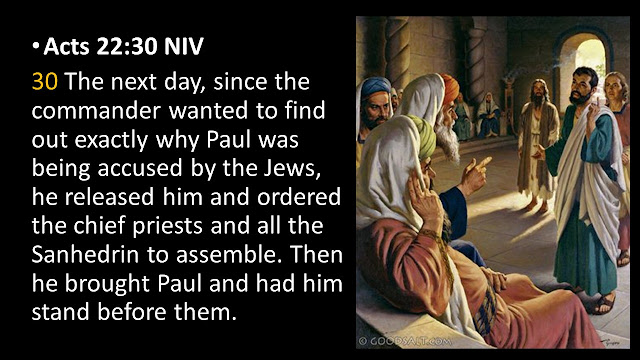Chapter 22 opens where chapter 21 ended with Paul’s speech to the Jerusalem Jews on the temple steps.
In the closing verses of chapter 22, Paul, being under Roman arrest, stood facing the angry Jewish crowd. V.1 picks up at that point, with Paul still facing them from the temple steps, as shown. He continues to address them in Aramaic, explaining his background as a Jew, that he studied under Gamaliel (a respected leading authority in the Sanhedrin) and as such Paul was thoroughly knowledgeable about Jewish law, and had been just as zealous as they were for the law.
Continuing in Aramaic, Paul tells them that he once believed as they do, even persecuting those of “the Way”—what Christians were called, believed to be a heretical Jewish sect. He tells them that the High Priest and Temple Council could testify to the truth of his statement, having been originally authorized by them to do so.
Paul explains how Jesus appeared to him while he was traveling to Damascus to arrest those of the Way, and bring them back for punishment and possibly even stoning as they had done with Stephen (Acts 7:57-59).
Paul continues explaining his encounter with Jesus. Ananias, though a Jewish-Christian, still observed Jewish law. Does it contradict grace alone through faith alone? As I would see it, being a true born-again follower of Christ, he knew he was saved by grace and not by religious observances. How significant is that? If you join us on our study of Galatians, Sunday at 9:00 in Heritage Lounge, you will see the full significance of this issue, and how it changed the Christian church in the 4th century, and why.
Most likely Ananias saw Jesus as the fulfillment of the Old Testament including His compliance with and perfect observance of the Mosaic Law. What does it mean (v.14) to be “chosen?” Why baptism? Was it necessary for salvation? If so, it was contrary to everything Paul taught so far in Acts (and Galatians and his other letters to the church). Again, join us each Sunday at 9:00 in Heritage Lounge, as we discuss these important topics, for a deeper understanding of our faith.
Explanation of Acts 22:16, downloaded from “Got Questions” on the web: https://www.gotquestions.org/baptism-Acts-22-16.html
God could have sent a legion of angels to protect Paul, but instead Jesus warned Paul to leave Jerusalem.
Paul recounts his persecution of “the Way”. Why did Jesus send Paul out of Jerusalem? His plan for Paul was to share the Gospel with the Gentile world. He was the only Apostle, as recorded in Scripture, to be sent to the Gentiles, other than Peter with Cornelius the Roman Centurion, back in chapter 10.
Here we see the benefits of Paul’s Roman citizenship. We also see the sovereignty of God in where and when Paul was born, which predetermined his Roman citizenship. The Gentiles, as noted in v.21, was the trigger that raised the anger of the Jews who hated the Gentiles, and Paul for reaching out to them. Again, being a Roman citizen was a position of influence.
Again, we see the merits of where Paul was born as a Roman citizen, which he notes to the Roman centurion as the soldier was about to flog him. It must have hit the centurion like a ton of bricks. If he had Paul flogged, he himself would have violated Roman law, and be subject to flogging as well.
Again, Roman citizenship was not only valued but carried significant benefits, as we see in this account. Paul's father either bought his citizenship or was influential and earned it, which was passed on to Paul. It clearly shows God’s sovereignty in regard to His plans for Paul and his ministry to the Gentile world. He was born a Jew, in the important city of Tarsus in the Roman province of Cilicia. He understood and spoke Greek and lived in the Roman/Greek culture, yet he was educated as a Pharisee, and could easily debate with the Judaizers who insisted that Gentiles who became Christian must observe Jewish law for salvation (join us Sunday morning as we continue to study this in detail. It's not to late).
Paul’s Roman citizenship alarmed not only the centurion, but also the commander, as we see in this account. Again, we see predestination, in regard to the apostle Paul: born a Jew in the important city of Tarsus in the Roman province of Cilicia. He understood and spoke Greek and lived in the Roman/Greek culture, all of which equipped him to bring the gospel to the Gentile world.
Map shows the location of Paul’s birthplace, Tarsus in the Roman province of Cilicia, now part of modern Turkey; almost all Muslim today. Does God have a plan to bring Christ back to that region? These are the types of studies we will be looking at each Sunday in Heritage Lounge. Join us.
A principle message in chapter 22 is how Paul, a Jew, was equipped by God to bring the Gospel to the Gentile world. Even the very existence of the Roman Empire made it possible for both safe travel and a common language. Again, we will be discussing this during our Sunday studies in Heritage Lounge. A brief summary of Paul: Born in the important Roman city of Tarsus, born of Roman-citizen parents, which made him a Roman citizen. He was raised in the Greek/Roman culture and spoke Greek and able to communicate with the Gentile world across the Roman Empire. Educated as a Pharisee which gave him an understanding of the law, and touched by the Holy Spirit which gave him understanding of grace. A clear example of God’s sovereign decree over history and even individuals, including you. What's God's plan for your life? He has one.
End of
The Acts of the Apostles
Chapter 22

















